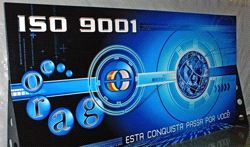Offset Printing
Boosting output in Brazil

Wednesday 12. January 2011 - Two KBA Rapida 75s at Corag in Porto Alegre
Last year Companhia Riograndense de Artes Gráficas (Corag), the government printing works in the Brazilian state of Rio Grande do Sul, boosted output with the addition of two B2 (29in) KBA Rapida 75 presses. The investment was part of an ongoing 75-million real ($44.3m) upgrade that also encompasses pre-press and finishing.
Founded in Porto Alegre in 1973, Corag employs 250 staff and prints both offset and digital. It specialises in books, government bulletins, documents and regulations but it also prints the documentation for public tenders. Around 80% of its sheetfed offset capacity is reserved for government contracts, the remaining 20% is used for jobs on the open market. In digital production the proportions are reversed.
Corag installed two KBA Rapida 75 press lines within a matter of months (4)
Company president Luciano Silva, technical director Arnaldo Amauri Rodrigues and offset production manager Alexandre Godinho de Oliveira were agreed that Corag’s production capacity was no longer capable of meeting demand, and that there was an urgent need to enhance quality and productivity with an equipment upgrade.
In-house, not outsourced
Luciano Silva says: “We had made virtually no major investments since 1995, and our lack of capacity meant that we had to contract out a lot of work at an annual cost of 1.2 million real. We decided to go for a high-tech, high-performance production tool offering real value for money. The Rapida 75.”
He continues: “The Rapida 75’s print format is ideal for our purposes, and the investment will pay off in no time. When the first press fulfilled our expectations with such ease we quickly signed up for a second one. At an open house on 30 September we demonstrated the potential of this half-format model to other printers in the region.”
Productivity-enhancing kit
Installed in April and October, the two 15,000sph 530 x 750mm (20.86 x 29.53in) KBA Rapidas replaced two older presses from another German manufacturer. Features include semi-automatic plate changers and automatic format setting, KBA DensiTronic closed-loop densitometry, and nonstop facilities at the feeder and delivery to boost productivity during long print runs. Communication with pre-press via CIP3 is standard, and both presses are linked online to KBA’s remote diagnostics system.
Technical director Arnaldo Amauri Rodrigues says: “Alongside press specs and production flexibility, one of our top priorities was service. The support provided by KBA-Grafitec and its agency Global Sistemas Graficos in terms of project planning, training and maintenance has given us total confidence and security in the event of any malfunctions. Our press operators have welcomed the new-generation presses with nothing short of euphoria!”
